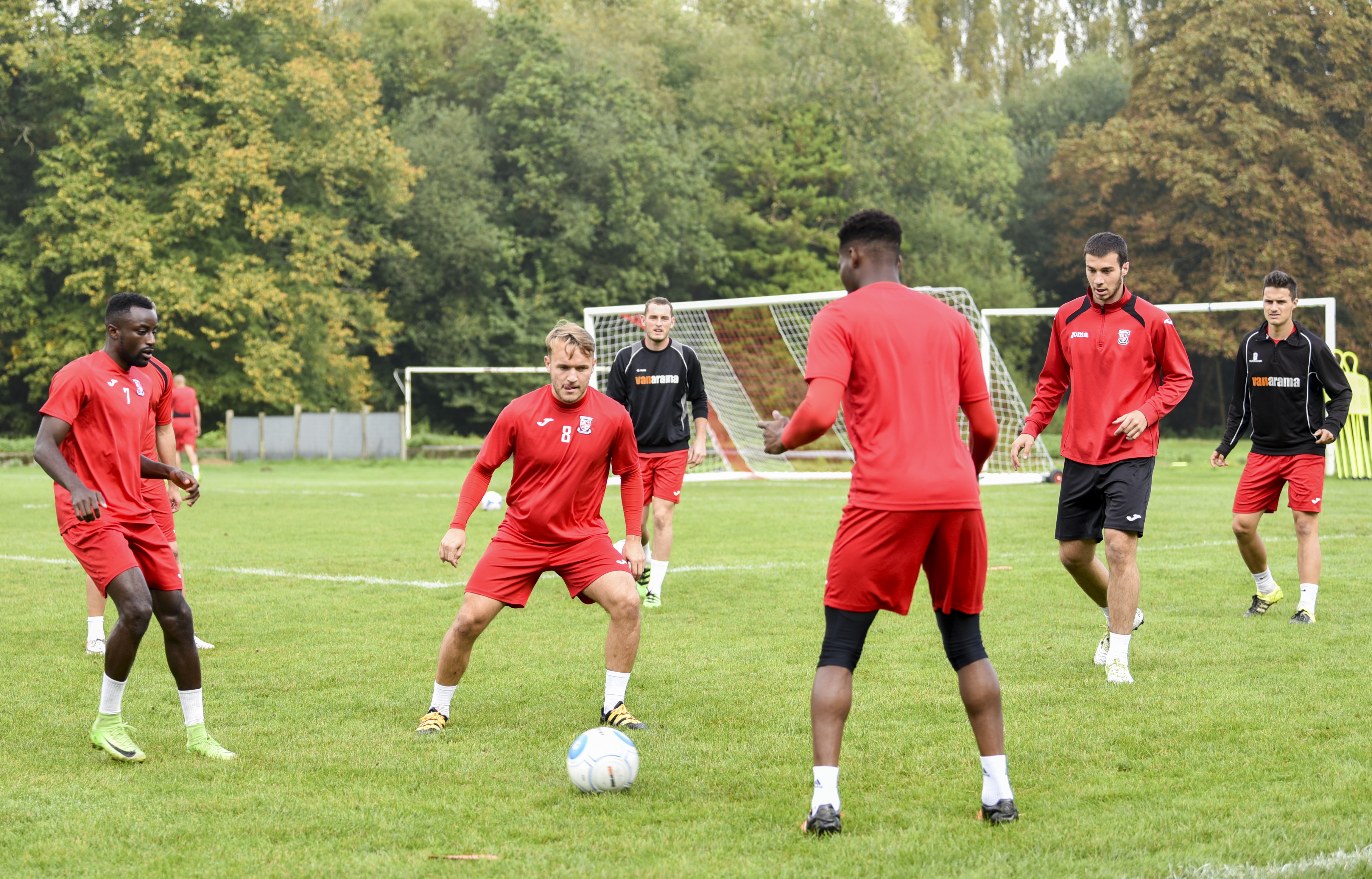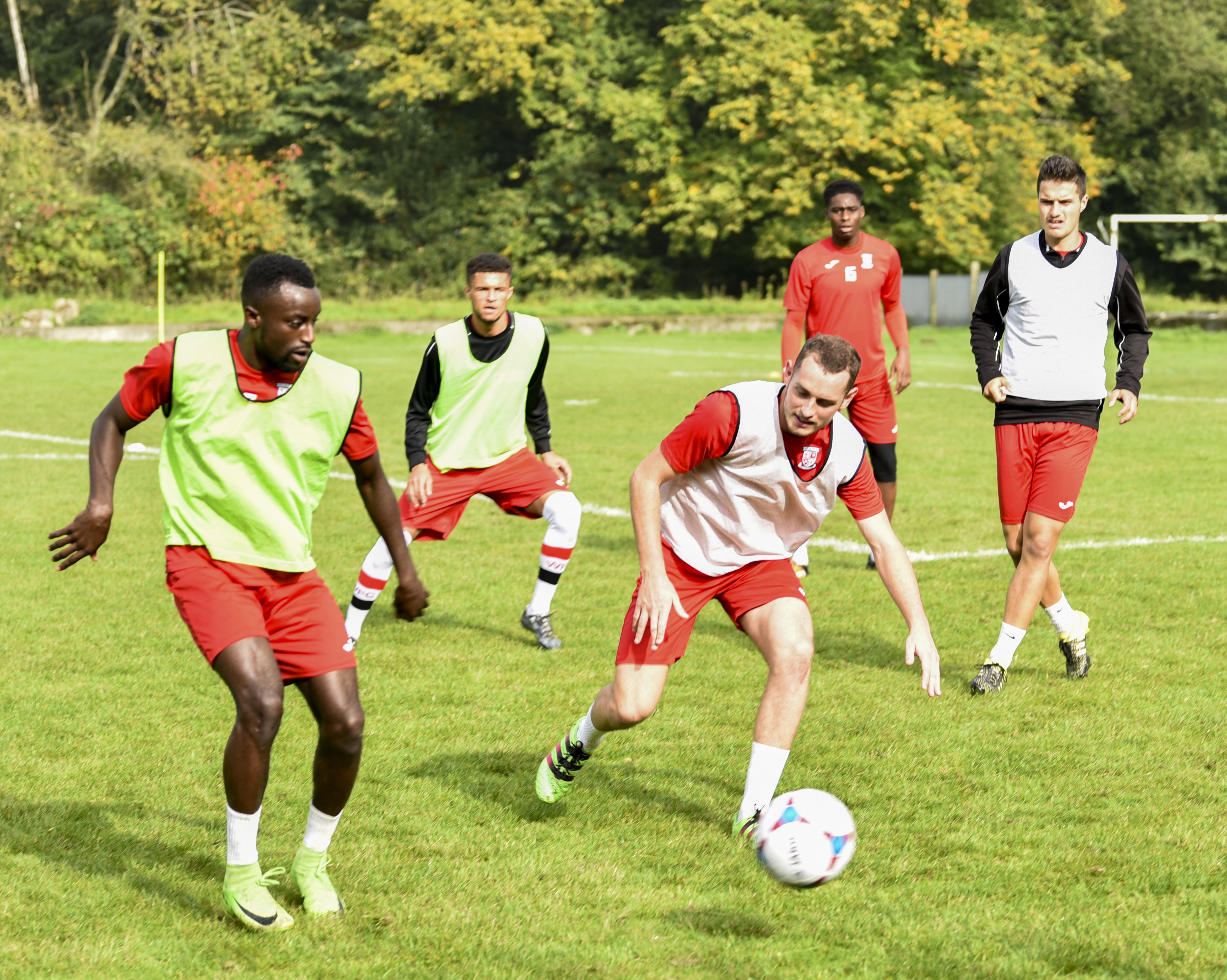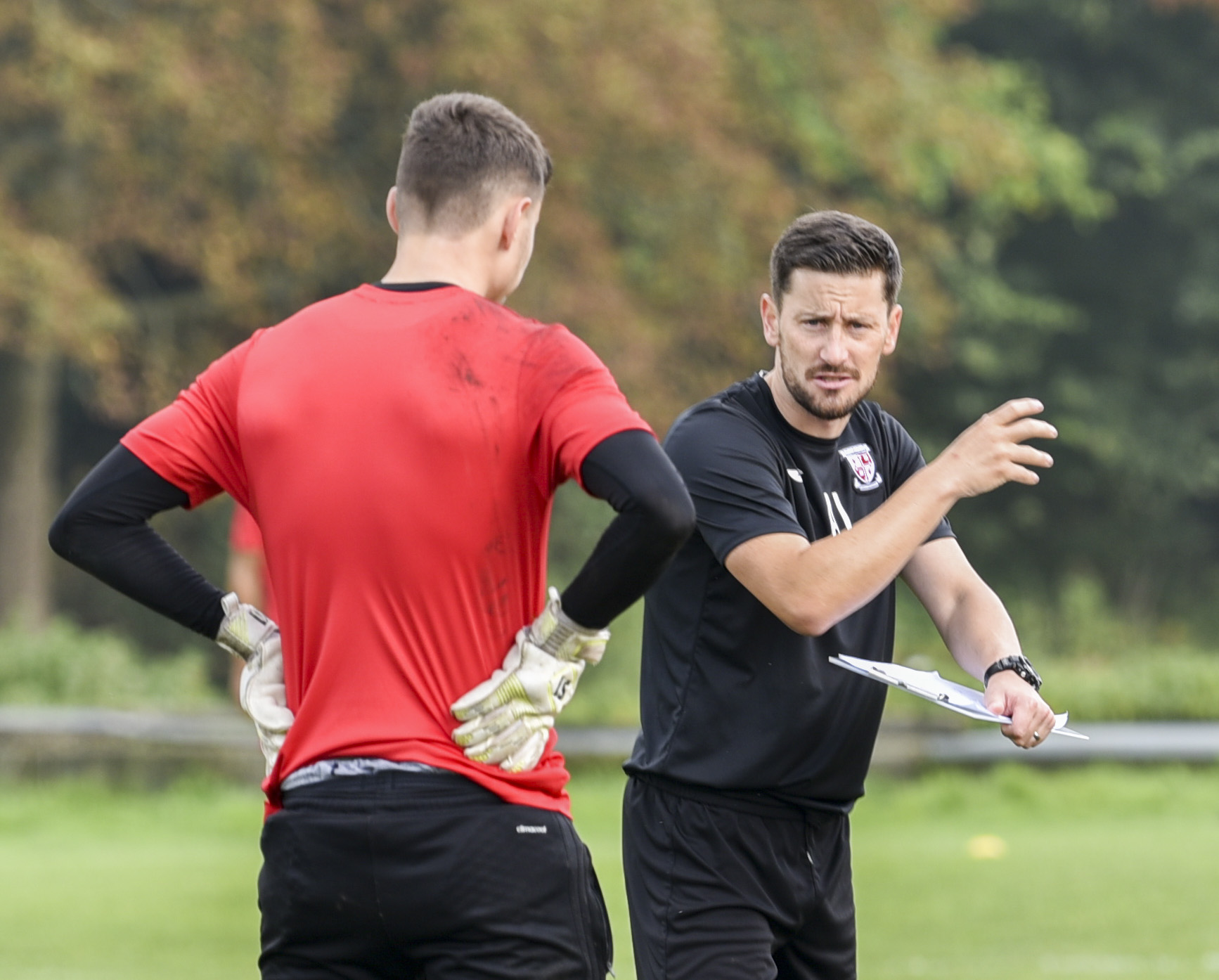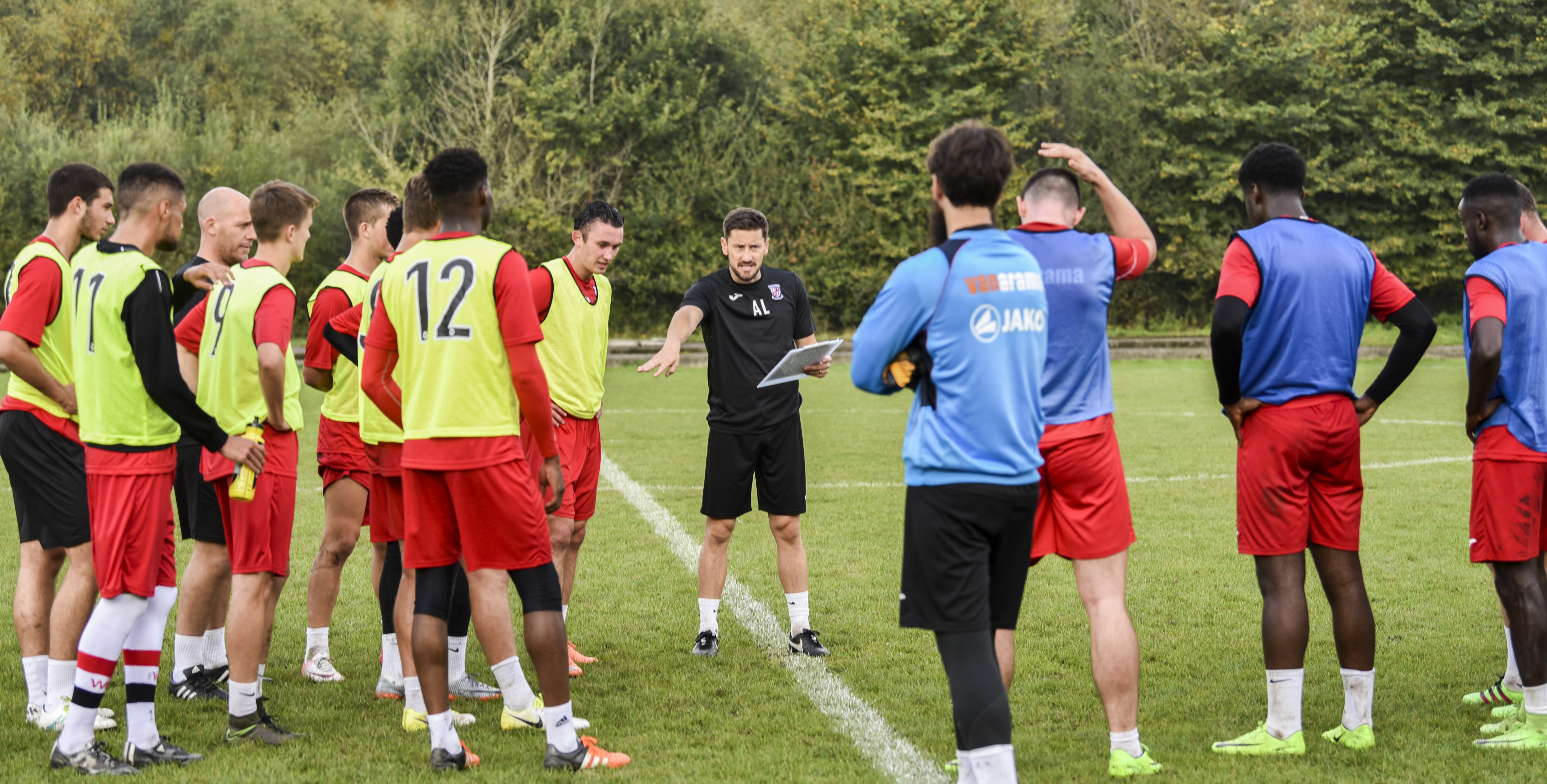Behind The Scenes: How Woking Keep Surprising The National League
In possibly the most unpredictable Vanarama National League season yet, we visit one of the division's early surprise packages for an inside look at how they're pulling it off...
At 5.30am the alarm clock of Woking manager Anthony Limbrick sounds. Within 30 minutes he’s begun his journey round the M25 from his home in East London to the Lion Park Sports Ground, five miles from the club’s stadium, for ‘Terror Tuesday’.
That’s the ominous name he’s given to his mid-week double training session which is having the desired effect on a match day.
The Cards have won three consecutive games, claimed five victories in their last six and sit just a point off leaders Sutton United, who they beat less than a fortnight ago.
It’s fair to say that not even the most optimistic Woking fans would have seen this start coming, under a 34-year-old taking his first steps into management.
Limbrick’s first job, if not hard enough already, also involves filling the shoes of the popular Garry Hill, who spent six and a half years as Woking boss.
By 8am, Aussie-born Limbrick and assistant Jason Goodliffe, have already setup the array of cones, poles, mannequins, bibs, footballs and goals, two hours before the players are due to arrive.
“We do that because as soon as the players turn up they see we’re ready to work,” Limbrick explains on a tour of the facility.
“We have everything we need here although it’s still a little rough around the edges,” as he points to a pile of scrap metal and a broken fence not far from the edge of the pitch. “But I like that.”
Limbrick’s squad must be in by 10am for training yet on this cloudy, but warm, morning, they’ve already arrived by 9.45.
“Some get in earlier for a bit of physio treatment or do their own thing. It’s pleasing to see and shows that they’re hungry to improve,” Limbrick adds.
Academy product Charlie Carter, with three goals to his name this season, is in the gym stretching while others loosen up on exercise bikes. Physio Prajwal Rai prepares last Saturday’s match winner Jamie Philpot. Outside there’s more activity.
Right-back Matt Young chips balls at the crossbar with Goodliffe while Fabio Saraiva, Joey Jones and Josh Staunton enjoy a round of football golf – spraying ‘drives’ across the pitch towards the poles, or rather ‘holes’, that Limbrick has setup for the session.
The boss himself, moments before training begins, exchanges drilled passes with winger Joe Ward, fresh from scoring his fifth goal of the season last Saturday.
There’s a highly impressive professional vibe amongst the players, despite the club still operating on a part-time basis. An extra day’s training was added this season, with the option of double sessions.
“We do a technical session in the afternoon, 2 till 3pm,” says Limbrick, a former academy coach at Southampton and West Ham.
“We do split sessions too, like this afternoon some defenders are going to do some clearances and headers with Jason and I do some end-product work with the attackers.
“On a Tuesday it allows us to get out the physical bit. We do a lot of running but all with a ball.
“On Monday’s we split the group up. The ones that played on Saturday do half the session and the others do the full one. Tuesday is a bigger hit day. Thursday is lighter and more tactical.”
The intensity is high. Limbrick and Goodliffe oversee a group each in the first half an hour, side-by-side. It’s keep ball in a small area with the focus on the player(s) in the middle trying to win the ball back. Gradually the drill changes, Limbrick introduces new dynamics each time but the intensity remains. Running seems easier, more enjoyable, for the players when it’s with a ball.
What’s also clear is how involved Limbrick is in the session. It’s different seeing him from a match day, where he’s the smartest person in the ground, wearing a suit. Here he has a tracksuit top on, with shorts and black boots. He’s in the thick of things, demanding more, encouraging and giving advice to his players. Limbrick’s enthusiasm is infectious.
“I’m very hands-on. I’m not saying that’s the right way but I always take everything and Jason assists me with that,” he says.
“I do a lot of the coaching and Jason adds bits of information in. I wanted an assistant who has had experience of the league. In the past I’ve always had someone who has played.
“I think when you get people that are the same, you get the same message. Jason says things in a different way, a different angle.
“On match days at half-time we leave the players for about five minutes by themselves while we discuss what we’re going to say, how we’re going to say it and to whom. We get out three or four key points, we don’t want to give them too much information.
“We don’t talk too much to the players after the game. I like to do a debrief on a Monday when everyone’s probably calmed down and has clear heads.
“We do a lot of video work. With that we’ll either do a team debrief or break into units – attackers, midfielders, defenders – and sometimes pick out individuals and show them clips."
Goodliffe is the definition of a battle hardened former pro having spent most of his playing career with the Cards’ bitter rivals Stevenage, as a centre-back.
He’s the perfect contrast to Limbrick’s 15 years of development as a coach - offering experience and no-how of the lower divisions.
Limbrick did play himself as a left-back/left-midfielder albeit “not a very good one”. At 15 he moved from his home in Tasmania, Australia to Brisbane before heading to London.
“I’d moved away from my family then so it probably wasn’t as big of a move to England because I was already away from them,” he says.
“I played when I was younger in Australia. My family are big football fans. You got to watch a lot of the three o’clock Premier League games over there, I loved watching Paolo Di Canio because of his creativity.
“I always had the dream of coming to England and playing at the highest level. When I got here I realised that level wasn’t going to be very high.”
At 21 Limbrick broke his leg playing for Wingate and Finchley, a turning point in his career.
“I could still play after the injury but I made the decision to focus on coaching. I think it was an advantage to start coaching so young. I had always studied the game as a player, training and nutrition methods. Psychology too, I found it all interesting.
“When I started off in coaching I studied a lot of coaches, mainly the ones that, like me, didn’t have a playing career at the highest level, like Brendan Rodgers and Paul Clement, who have come through the coaching system. Arrigo Sacchi in Italy, who never played professionally. I think there’s a lot more of those coaches now.
“One of the main ones I’ve learnt off is Mauricio Pochettino when he was at Southampton. He was a player but is a great coach and man manager. I look at it both ways.”
Limbrick’s hands-on approach increases as the session moves into its main part. Using more of the pitch, he explains the drill to his players: 8 v 8, with the aim to score in end zones. Both sides are set different ways of doing so. One team, must run the ball in, the other pass it. Impressive 18-year-old goalkeeper Nathan Baxter must launch the ball over half-way, working on his kicking, which also makes use of striker Inih Effiong’s hold-up play, enabling midfielders to get around and beyond him.
Limbrick is right in the middle of the action, like a conductor of an orchestra. Goodliffe is on the side, chipping in when he can while also hopelessly trying to give offside decisions for both teams.
The young Woking squad are fiercely competitive. So much so that even Goodliffe reminds the players to be careful not to injure anyone, moments after Kane Ferdinand’s raised boot managed to be avoided by Staunton.
The confidence of the players is another major factor. Ward, Regan Charles-Cook and Jason Banton skillfully reflected the good run of form the team has been on.
“You have to try and stay as level headed as you can,” said Limbrick, whose side is top of the form table for the last six matches. “You’re not the best or the worst team in the world if you win or lose a few. You always think about what you could have done better but it doesn’t keep me up at night. I always sleep quite well, I think it’s because I’m quite tired!
“We are passionate and we get quite excited as staff and players when we win. We might celebrate like we’ve won the league sometimes but it just shows that it means a lot to us. “Because the league is so open it’s given us an opportunity. Everyone’s beating everyone at the moment. The plan was to make the home form good, that is key, and we’ve done that.”
The Cards will hope to make it an outstanding six home wins from seven this Saturday at the Laithwaite Community Stadium when Hartlepool United come to town - and Limbrick’s already started his homework.
“We always watch the opposition and take in their last three games. It’s important to see what the opposition are like away but also at home. We might not relay all that information to the players but we give it to whoever needs it. We prep well for the opposition but focus on what we need to do also.
“We have the captain (Richard Orlu) and vice-captain (Joey Jones) still to come back. Even though we’ve won three in a row, we’ve had a double session today and we’re working very hard.”
Limbrick’s trademark sheep whistle brings the session to an end at 12.30 and some final motivating words to reinforce the players’ hard work sends them on their way to lunch before the afternoon’s activity.
Another ‘Terror Tuesday’ was drawing to a close but Limbrick’s time as manager has been far from a nightmare. In a top-half this close, with two extra play-off spots available, an even bigger surprise might be waiting. Until then the young Cards manager will relish the sound of the 5.30am alarm clock.
Pictures by David Holmes.
For more coverage, reaction and some of the best moments from games going throughout the season, head to our social media channels on Twitter, Facebook and now Instagram.
Latest match highlights
Where next?





















